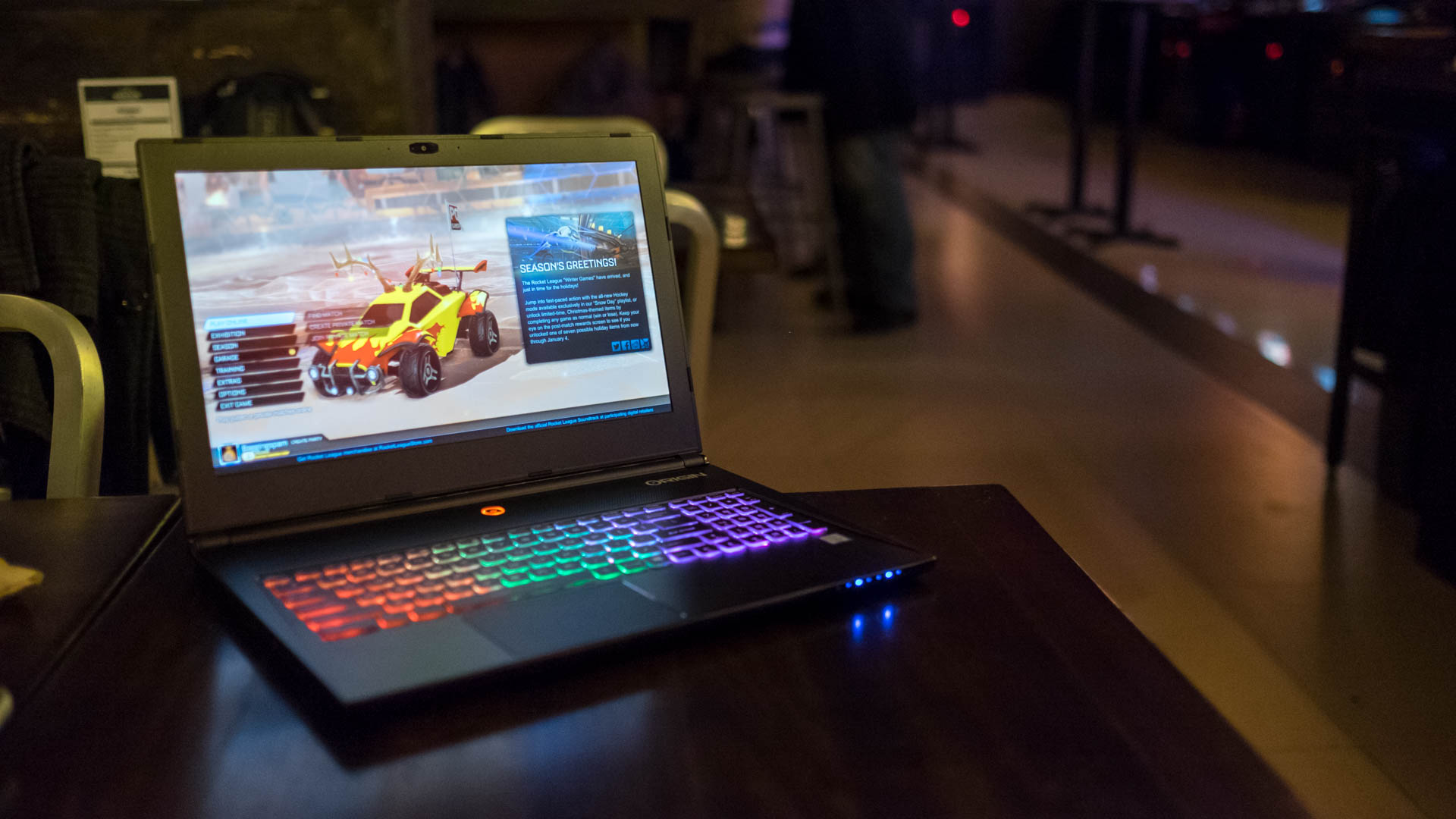Why you can trust TechRadar
You would be right to call the Origin EVO15-S and the MSI GS60 Ghost Pro twins. They both share the same exact dimensions of 15.35 x 10.47 x 0.78 inches (39 x 26.6 x 1.98cm). The two machine even weigh the same at 4.2 pounds (1.9kg).
Similarly, the last iteration of Origin's 15-inch gaming laptop also used the same chassis, but the newer model is 0.01 pounds lighter despite incorporating a more complex RGB keyboard.
The EVO15-S is much more compact than hardcore gaming rigs, like the Acer Predator 15, which measures in at 15.4 x 11.8 x 1.5 inches (39.1 x 30 x 3.8cm) and weighs 7.5 pounds (3.4kg). This notebook is particularly thicker because it has a bit more going on, with its swappable optical drive.
Still, the EVO-15S is a bit larger than most contemporary, 15.6-inch laptops, so it might be a tight fit even for bags designed to carry notebooks of this screen size.
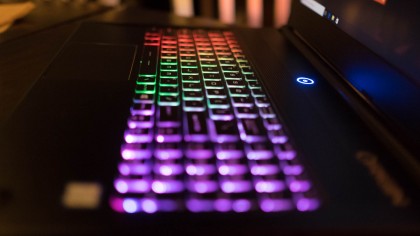
Here is the Origin EVO15-S configuration given to techradar for review:
Spec sheet
- CPU: 2.6GHz Intel Core i7-6700HQ (quad-core, 6MB cache, up to 3.5GHz with TurboBoost)
- Graphics: Nvidia GeForce GTX 970M (6GB GDDR5 RAM); Intel HD Graphics 530
- RAM: 16GB (2 x 8GB) DDR4 (2,133MHz)
- Screen: 15.6-inch, 1,920 x 1,080 IPS anti-glare display
- Storage: 256GB PCIe m.2 SSD, 1TB Origin PC-approved hard drive (7,200RPM)
- Ports: 2 x USB 3.0, 1 x Thunderbolt 3.0 (USB C connector), HDMI, SD card reader, mini DisplayPort, Killer E2400 LAN, headphone jack, microphone jack
- Connectivity: Intel Dual Band Wireless-AC 8260 and Bluetooth combo
- Camera: Built-in 720p video camera
- Weight: 4.2 pounds
- Size: 15.35 x 10.47 x 0.78 inches (W x D x H)
What you're looking at is a largely stock EVO15-S available for a cool $2,294 (about £1,614, AU$3,278). The only little extra on our unit was Origin's LCD screen calibration, which I recommend ticking on your custom configuration, as the display out of the box runs a little too cool for my liking.
In the grand scheme of gaming laptops, the base EVO15-S a pretty well-priced rig, though it's not as customizable as Origin's other machines. You'll be pretty much be stuck with choosing an Intel Core i7-4710HQ processor and the Nvidia GTX 970M for graphics. The most annoying this is you won't be able to increase the system's storage and memory spec unless you put in a custom order or add the components yourself.
Sign up for breaking news, reviews, opinion, top tech deals, and more.
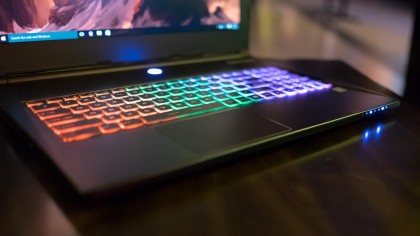
The one option you do have is upgrading to a 3,840 x 2,160 glossy IPS display, which only brings the cost of this notebook up to $2,397 (about £1,673, AU$3,413). Not too shabby considering your quadrupling the display resolution for 103 bones.
Of course, there are plenty of options. If you've got the cash to burn, you could pick up a a comparable MSI GS60 Ghost Pro for $1,799 (£1,388, AU$2,699). Alternatively, the Acer Predator 15 goes for $1,999 or AU$2,999 (about £1,395) if you're willing to pay up to upgrade the graphics to a Nvidia GTX 980M with 4GB of video RAM.
It might seem obvious to pick the MSI GS60 Ghost, as you're getting virtually the same machine for a lower price. But Origin has upgraded a few of the components, such as the sound card. The boutique PC maker also offers more services than MSI, including an optional display calibration and a bundled year of part replacement and service.
So, while you'll be paying more for the Origin EVO15-S, the price bump is somewhat justified, if you want the extras that come with it.
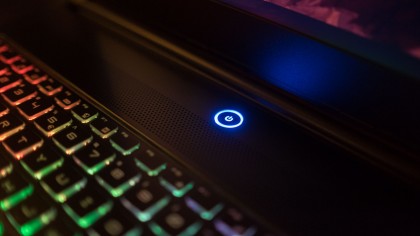
Performance
With such a powerful chipset humming inside the laptop, I never experienced a single hitch, even when asking the EVO15-S to juggle a dozen tasks at a time. I was also able to play Shadow of Mordor at a decent 55 frames per second (fps) on ultra settings, just a slight step behind the 60 fps on my own desktop rig, fitted with a Core i5-3750K and GTX 970.
I was also able to easily coax this portable gaming rig to play Star Wars: Battlefront at a respectable 60 to 90 fps, even with the game running on Ultra settings.
Benchmark scores
- 3DMark: Cloud Gate: 21,574; Sky Diver: 19,195; Fire Strike: 6,673
- Cinebench CPU: 676 points; Graphics: 65 fps,
- GeekBench: 3,593 (single-core); 13,392 (multi-core)
- PCMark 8 (Home Test): 3,416 points
- PCMark 8 Battery Life: 1 hours and 49 minutes
- Middle Earth: Shadow of Mordor (1080p, Ultra): 55 fps; (1080p, Low): 122 fps
- Metro: Last Light (1080p, Ultra): 30 fps; (1080p, Low): 54 fps
- Grand Theft Auto V (1080p, Ultra): 29.30; (1080p, Low): 132.74
Let's just remind ourselves how that compares to the 2014 Haswell model's scores:
- 3DMark: Ice Storm: 85,137; Cloud Gate: 18,777; Fire Strike: 5,559
- Cinebench Graphics: 101 fps, CPU: 649 points
- PCMark 8 (Home Test): 3,239 points
- PCMark 8 Battery Life: 2 hours and 2 minutes
- Bioshock Infinite (1080p, Ultra): 71 fps; (1080p, Low): 165 fps
- Metro: Last Light (1080p, Ultra): 28 fps; (1080p, Low): 101 fps
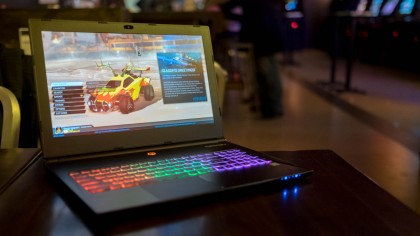
As expected, the Origin put up some of the impressive scores, easily outpacing its two-year old predecessor. The 3DMark benchmark shows us just how much more weight Intel's latest Skylake chipset and Nvidia's Maxwell mobile chips can pull with such Cloud Gate and Firestrike scores.
By comparison, the Ghost Pro, equipped with half the amount of video RAM, completed the Fire Strike benchmark with 6,558 points. Meanwhile, the Gigabyte scored 8,277 points on the Fire Strike test, thanks to its higher-end GPU.
The results from the crucible we've come to know as Metro: Last Light on Ultra are even more telling. The EVO15-S was able to play this taxing game at an average 30 fps. Comparatively, the MSI rig was able to keep up, rendering the benchmark at a nearly identical 29 fps, while the Acer Predator 15 performed even better with 33 fps.
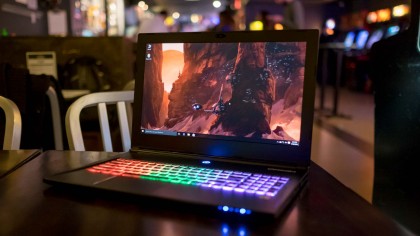
Pixel perfect
As if the EVO15-S's excellent gaming performance wasn't enough, Origin has also equipped its thinnest laptop with an equally pleasing 1080p screen. Even at a quarter brightness, the display is more than bright enough to counterbalance bright sunlight.
Meanwhile, the anti-glare coating does an excellent job at subduing reflections and glare. The screen also produces a wide color gamut and stellar contrast, everything I expect out of any self-respecting IPS panel.
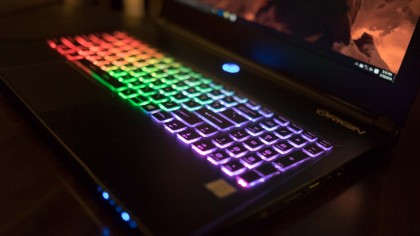
Running short
The only area I find the Origin EVO15-S lacking in is battery life. PCMark 8 quickly drained the battery in a matter of 1 hour and 49 minutes – that's actually a 14 minute decrease from its predecessor.
The Origin laptop also ran for a short-lived 2 hours and 15 minutes (also 3 minutes shorter) with my own basic everyday tasks of browsing on Firefox and writing in Microsoft Word. Overall, this rig lasted for its longest stretch of 2 hours and 23 minutes while barely finishing a locally-played run of Guardians of the Galaxy in its entirety.
The MSI GS60 Ghost Pro, on the other hand, managed to hang on for an equally short for 2 hours and 2 minutes while running the PCMark battery test. Lastly, the longest lasting machine crown goes to the Acer Predator 15, with its 3 hours and 17 minutes-long run time.
Bundled software
Origin has done a great job of trimming the fat on preloaded software, even going so far as to stick with just one audio controller, as opposed to the usual two to four (seriously).
- Soundblaster Cinema: Here you'll find sound profiles and the underlying audio controller. Unlike some other audio tools, Creative has made and excellent visually driven interface.
- SteelSeries Engine: Of course when you have a gaming laptop there has to be a tool for setting up macros and and customizing your keyboard colors. This is your go to application.

Kevin Lee was a former computing reporter at TechRadar. Kevin is now the SEO Updates Editor at IGN based in New York. He handles all of the best of tech buying guides while also dipping his hand in the entertainment and games evergreen content. Kevin has over eight years of experience in the tech and games publications with previous bylines at Polygon, PC World, and more. Outside of work, Kevin is major movie buff of cult and bad films. He also regularly plays flight & space sim and racing games. IRL he's a fan of archery, axe throwing, and board games.
